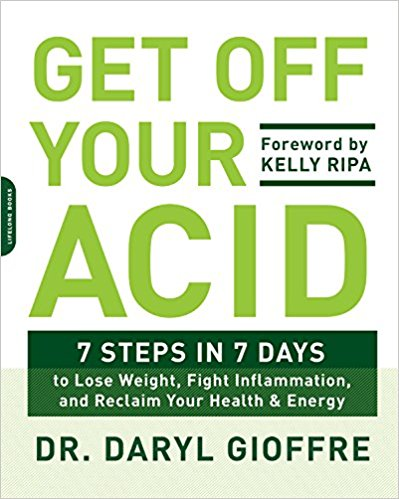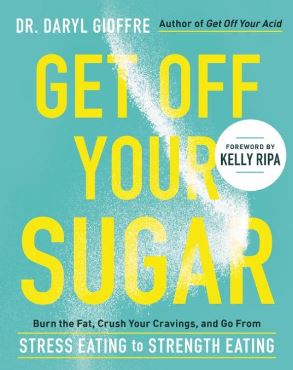 Do you ever walk into a room and immediately forget why you went there?
Do you ever walk into a room and immediately forget why you went there?Or the worst… A loved one is talking to you, and your brain is off in space, completely unable to focus on what they’re saying because your mind is elsewhere.
These are all symptoms of brain fog, which is not a disease or diagnosable condition, but it affects adults of all ages. While it’s often associated with aging, 14% of adults in their 20s and 30s say they experience brain fog compared to a quarter of middle-age adults, so it really affects all ages, especially in times of stress.
It may be quite common, but that doesn’t mean it is normal! Or something you have to live with!
Here’s the good news about brain fog if you suffer from it… There are reasons you feel the way you do, and there are solutions to bring you back to feeling sharp, focused, clear-headed, motivated, and calm.
Today, we’ll explore what’s causing your symptoms, – deficiencies in key nutrients – why they may be worse in the winter, and what you can do to lift the fog.
So what is brain fog exactly?
 Brain fog is a combination of mental and physical symptoms that lead to a foggy, unclear feeling, including:
Brain fog is a combination of mental and physical symptoms that lead to a foggy, unclear feeling, including:
- Difficulty concentrating
- Fatigue or lack of energy
- Headaches
- Irritability
- Forgetfulness
- Anxiety
- Depression
- Confusion
Brain fog can be worse for some people in the winter, when there’s less sunlight and time spent outdoors (keep reading for why that’s important). If you’ve ever thought you may suffer from Seasonal Affective Disorder (or SAD), brain fog can be one of the symptoms.
Brain fog can be caused by 1) a slow metabolism, 2) hormonal changes that are associated with aging, 3) stress, and 4) deficiencies in key nutrients. It’s possible 2 or 3 or even all 4 of the contributing factors are adding up to overall brain fog.
Today, we’re going to focus on deficiencies in key nutrients, because fixing these will also speed up the metabolism and stabilize hormone levels. But first, a word about stress.
Increased levels of anxiety and/or stress contribute to forgetfulness, lack of energy, mood changes, worries clouding your thoughts, and restlessness.
The best thing you can do to fight brain fog symptoms that come from increased stress is use a few mental hacks to fight it:
- Aim to get more quality sleep. Lack of sleep or restless sleep is associated with increased stress levels.
- Think of anxiety as a tool rather than a deficiency. Moderate levels of anxiety are associated with improved performance, so focus on keeping anxiety in check rather than getting rid of it completely.
- Use meditation, yoga, or other mindfulness strategies to reduce stress.
Remember, stress outweighs acids you eat a million times to one, so this is really important! Brain health is absolutely essential to everything we do, including our well-being and longevity.
Without brain health, what do we have?
Throughout the rest of this article, we’re going to focus on nutrients your body is likely deficient in if you are experiencing brain fog. These are the best neuroprotectors for your brain, including the single most important mineral for neural health and combatting stress.
5 Nutrients That Fight Brain Fog
Vitamin D:
 42% of American adults are deficient in the one vitamin (actually, it’s a hormone!) that most affects the brain. People who are vitamin D deficient perform worse on standardized tests, have difficulty focusing, and have difficulty making smart decisions, according to research.
42% of American adults are deficient in the one vitamin (actually, it’s a hormone!) that most affects the brain. People who are vitamin D deficient perform worse on standardized tests, have difficulty focusing, and have difficulty making smart decisions, according to research.
Not only that, but vitamin D continues to be highly important as we age. One study showed that people with low levels of vitamin D were more than twice as likely to develop Alzheimer’s and other forms of dementia than people with normal levels.
That reinforces the findings of other studies. Getting plenty of vitamin D helps prevent cognitive diseases in aging adults and improves the symptoms of dementia in people who have been diagnosed.
The best treatment for increasing your levels of vitamin D, which you almost certainly need to do, is two-fold and you really need to do both. First, aim to spend 20 or more minutes of time outside on sunny days, ideally doing some sort of physical activity rather than sunbathing.
Second, supplement with a high-quality liquid D3 supplement. Our new Acid-Kicking D3+K2 is the best vitamin D supplement on the market.
 D3 is stronger when paired with vitamin K2. Our plant-based liquid supplement is made from the highest quality sources of D3 and K2, called MK-7, along with organic oil, organic extra virgin olive oil, and vitamin E to increases bioavailability, absorption, and assimilation. I recommend 5,000IU, or one half dropper, daily for everyone.
D3 is stronger when paired with vitamin K2. Our plant-based liquid supplement is made from the highest quality sources of D3 and K2, called MK-7, along with organic oil, organic extra virgin olive oil, and vitamin E to increases bioavailability, absorption, and assimilation. I recommend 5,000IU, or one half dropper, daily for everyone.
Try it today in Mint or Unflavored!
Choline:
Choline is a micronutrient – technically not a vitamin or mineral, but similar to a vitamin – that is required for brain and nervous system function, including muscle control, memory, fetal brain development, and mood.
Research has shown choline helps prevent Alzheimer’s and other forms of dementia by preventing 3 markers of brain degeneration. Likewise, people who are deficient in choline are at greater risk for cognitive and memory problems.
Although our bodies produce a small amount of choline, we need to consume most of our supply from food and/or supplements. Choline can be found in these alkaline foods:
- Salmon (1 serving = 44% of recommended daily value of choline)
- Chickpeas (36% RDV)
- Split peas (34% RDV)
- Navy beans (32% RDV)
- Cauliflower (8% RDV)
- Brussels sprouts (3% RDV)
Even if you eat a diet rich in foods with choline, you still could be deficient because the gut and liver does not always absorb choline properly. If you’re concerned that you may be deficient because you experience brain fog, cognitive decline, mood disorders, or low energy levels, talk to your doctor about testing choline levels. You can take a choline supplement, but I recommend you choose a good quality supplement made from whole foods.
because the gut and liver does not always absorb choline properly. If you’re concerned that you may be deficient because you experience brain fog, cognitive decline, mood disorders, or low energy levels, talk to your doctor about testing choline levels. You can take a choline supplement, but I recommend you choose a good quality supplement made from whole foods.
Magnesium – the #1 most important neuroprotector!
Magnesium does so many essential functions throughout the body – more than 500 activities in fact. Learning, memory, and mood are among the many ways magnesium levels affect the brain. Low magnesium levels have been linked to:
▪ Depression
▪ Mental illness
▪ Anxiety
▪ Migraines
▪ Epilepsy
▪ Muscle spasms
▪ Sugar cravings
▪ Other neurological diseases
A couple of studies have found that magnesium could be a powerful treatment for people with depression, perhaps just as effective as antidepressants without the side effects. How crazy is that?
Two more studies have found that magnesium supplementation is as effective at treating migraine headaches as over the counter pain relievers in children and adults. That’s amazing!
Foods rich in chlorophyll are high in magnesium. So aim for lots of:

- Spinach (1 cup = 49% RDV of magnesium!)
- Watercress
- Kale
- Chard
- Collard and turnip greens
- Wheatgrass
Magnesium can also be found in these foods:
- Black beans
- Mung beans
- Almonds
- Cashews
- Pumpkin seeds
- Avocados
- Bananas
- Broccoli
- Brussels sprouts
While eating foods rich in magnesium is the best way to absorb it, most people don’t eat nearly enough of the foods that supply it. So I recommend you include magnesium supplementation as part of your everyday nutrition.
However, it’s important to note that magnesium supplements can have a laxative effect or cause intestinal irritation. So you have to be careful and take a high-quality mineral supplement that will deliver not only the right amount of magnesium, but also in the right proportion to other minerals.
I created Acid-Kicking Minerals to supply exactly that. Other mineral supplements are expensive rocks – literally! And many of them throw off the balance of these key minerals. Switch to Acid-Kicking Minerals for a better night’s sleep, improved focus, and less stress.
Vitamin B12
People who are deficient in vitamin B12 score lower on cognitive testing, report higher levels of brain fog, and may actually experience brain shrinkage, according to emerging research. Studies tracking people who get enough B12 are at a lower risk for developing Alzheimer’s as they age.
This is one that people who eat a strictly plant-based diet need to take extra precaution against becoming deficient. Animal products are the main source of vitamin B12, but even many people who eat animal protein regularly do not get enough. So you can supplement with B12, as well as eat foods fortified with B12 like coconut milk and almond milk. I take a sublingual lozenge that also helps deal with methylation.
The Brain Boosters in Hazelnut Coffee Alkalizer
Just like all of our delicious flavors, Acid-Kicking Hazelnut Coffee Alkalizer  makes your coffee creamy and slightly sweet, while neutralizing the acid and delivering fat-burning enzymes to keep you focused, energized, and feeling good all day.
makes your coffee creamy and slightly sweet, while neutralizing the acid and delivering fat-burning enzymes to keep you focused, energized, and feeling good all day.
But new Hazelnut has something none of our other flavors have to offer (yet): the brain-boosting power of Alpha-GPC, Lion’s Mane, and L-Theanine. What are these superfoods that optimize focus?
- Lion’s Mane is a mushroom long used in traditional Chinese medicine that stimulates brain cell growth and protects against memory loss. Unlike most mushrooms, Lion’s Mane is antibacterial, antifungal, and antiviral.
- Alpha-GPC is a natural choline compound found in the brain that increases cognitive function, enhances learning capacity, and improves memory.
- L-Theanine is an amino acid that boosts focus, improves executive functioning, and helps reduce stress and anxiety.
This trio is the most powerful antidote to brain fog that you can take with your morning coffee!
Try it now or Subscribe & Save 15%!
GET OFF YOUR ACID!
Dr. Daryl
 Skip to content
Skip to content






